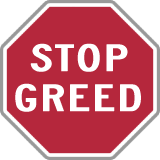Washington could be trapped in a vicious economic death spiral without tax reform
The governor and lawmakers had been hoping that the economy would rebound, sparing already weakened or reduced public services from further blows. Unfortunately, the outlook remains grim. The state is likely to face another massive budget shortfall in January, which could be significantly magnified by the passage of one or more of the five corporate initiatives on the November ballot. In the meantime, not enough revenue is flowing into the treasury to meet expenditures.
Our fiscal problems stem from Washington's dependence on consumption taxes. When Washingtonians aren't buying things (whether they be homes, automobiles, electronics, etc.), that depresses the amount of revenue that is collected. When our common wealth isn't healthy enough to cover projected costs, we end up facing a deficit, which lawmakers must close to avoid going into debt.
Revenue is thus linked to consumer spending and consumer confidence. And consumer spending is linked to unemployment. People who are out of work obviously don't have the means to spend much, but even people who have jobs are more likely to be frugal when unemployment is high.
Sadly, unemployment isn't falling. But it isn't because businesses aren't hiring. Here's the Economic Revenue and Forecast Council (PDF):
The Washington recovery seems to have lost momentum in the summer months after strong growth in the spring. In June and July, the private sector has added 5,500 jobs which is better than the national rate but still a little weaker than our last forecast. During the same period, however, state and local governments shed 4,700 jobs, offsetting most of the private sector gains.Republicans might not think that government jobs are real jobs, but a pink slip has serious ramifications for the economy whether it's issued by a government agency or a private employer. We are doing ourselves no favors by laying off our public servants. The more we cut back, the more jobs we eliminate. Eliminating jobs keeps unemployment high or makes it even worse, which keeps a damper on consumer spending and thus further depresses revenue collection.
It's a vicious economic cycle which our elected leaders seem unable to cope with.
It's time to face reality: there is no returning to 2006. When the economy does rebound, people aren't just going to go back to their old ways and ramp up their shopping. Too many lived beyond their means during the Bush error.
Republicans (and some Democrats) like to talk about government living within its means, as if government was some kind of supersized household. Contrary to what Tim Eyman and right wing legislators claim, however, neither state revenue nor state expenditures are higher than they have historically been since the 1970s.
In fact, they're lower.
Washington State was not badly managed during the Bush error. We are collectively victims of the mismanagement that occurred at the federal level. But it doesn't matter that our state's leaders didn't cause the Great Recession. What matters is what they are going to do about our situation now. Lawmakers cannot expect much help from Congress in 2011. We are largely on our own.
I often characterize the Legislature's decision-making in conversation by saying that they like to take the lowest road. By that, I mean that legislators (and other elected leaders) tend to gravitate towards what feels like the most painless course of action, even if it makes little sense long-term.
Metaphorically, the lowest road is the path with the least elevation gain. It looks like the easiest route to travel, but it's really the most dangerous, because it is the most susceptible to mudslides and flooding. Inevitably, an obstacle materializes and the lowest road ceases to become a road at all.
Lawmakers and Governor Chris Gregoire need to quit holding out hope that consumer spending will soon revive and make their jobs easier. Their job is to govern as responsibly as they can, not merely decide how to spend whatever money we have. If they are responsible they will act to protect our state's public services, which are in danger of being eviscerated. That, in turn, means protecting our common wealth, which pays for those vital services which Washingtonians rely on each and every day. The key to protecting our common wealth is tax reform.
Gregoire and lawmakers can thank Bill Gates Sr. and Washington's labor movement for investing their own clout and their own resources into an initiative that would levy an income tax on high earners. Initiative 1098, which NPI strongly and unequivocally supports, can certainly help offset horrific cuts if it passes and survives a potential court challenge.
But it is only one piece of the puzzle.
In a followup post on Wednesday, I'll sketch out several ideas for strengthening our common wealth, retooling state government, and improving our state's economic security. We don't pretend to have all the answers, but what we do know is that the status quo is not sustainable, and that the right wing's answer — privatization and deregulation — will only make a bad situation worse.
We have to rethink how we pay for and provide the vital services that Washingtonians need without compromising our quality of life.


Comments:
Post a Comment